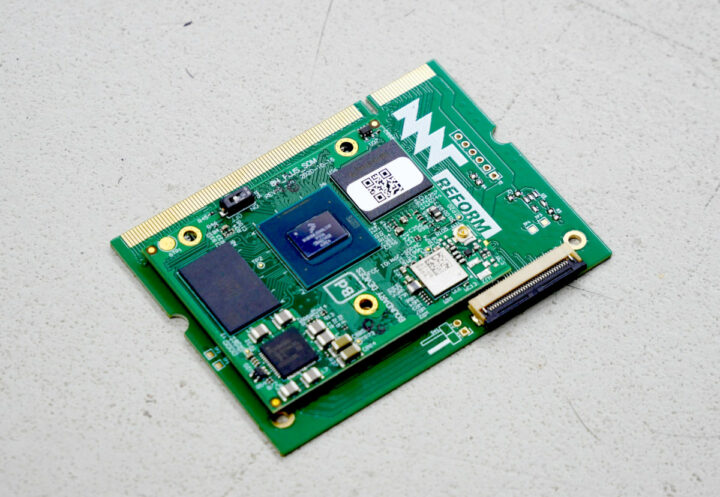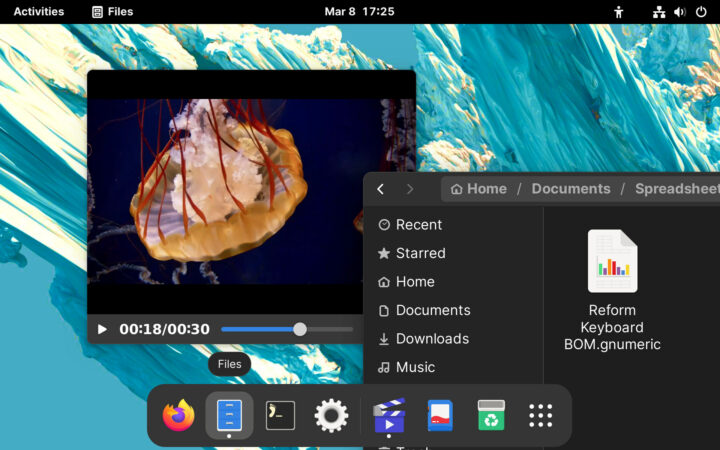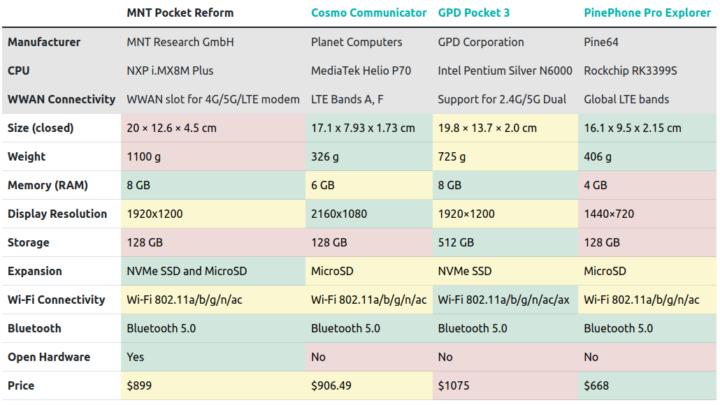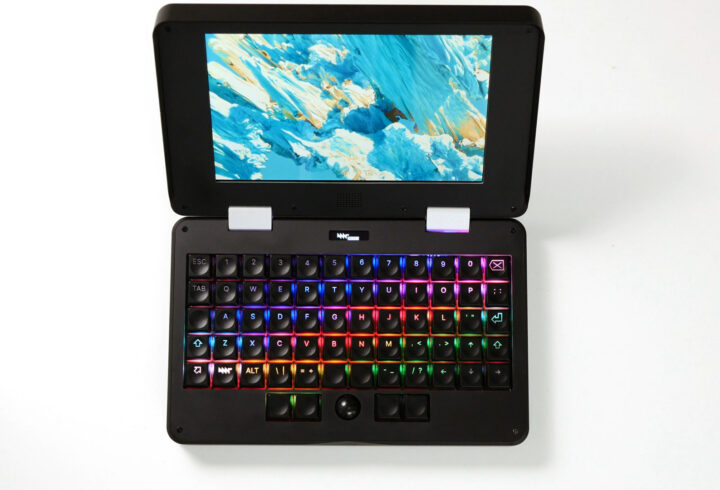The MNT Pocket Reform, a smaller version of the MNT Reform laptop, with a 7-inch display has just launched on Crowd Supply with an NXP i.MX8M Plus system-on-module, but also compatible with an NXP Layerscape LS1028A module, Raspberry Pi CM4, Pine64 SOQuartz, and an AMD Kintex-7 FGPA module.
The open-source modular laptop also comes with a 128GB eMMC flash, 8GB RAM, WiFi 5 and Bluetooth 5.0 connectivity on-module, an optional 1TB NVMe SSD, a backlit 60-key mechanical keyboard with an optical trackball and four buttons, a micro HDMI port to connect an external display, a few USB ports, and Ethernet through an ix industrial connector.
MNT Pocket Reform specifications:
- SoM – Boundary Devices Nitrogem8M Plus system-on-module with
- SoC – NXP i.MX 8M Plus quad-core Arm Cortex-A53 @ 1.8GHz with Cortex-M7 real-time core, Vivante GC7000UL GPU, 2.3 TOPS NPU with open drivers, H.264/H.265 Video Decoder with open drivers (Hantro), and HiFi4 Audio DSP
- System Memory – 8GB DDR4
- Storage – 128GB eMMC flash
- Wireless – WiFi 5 (802.11ac) & Bluetooth 5.0 (Qualcomm QCA9377-3)
- Storage
- M.2 NVMe 2280 SSD slot (up to 2TB)
- MicroSD card slot
- Full-disk encryption (LUKS) is enabled by default
- Display – 7-inch display with 1920×1200 resolution, ~310 ppi
- Video Output – Micro HDMI up to 4K resolution
- Audio
- Texas Instruments DAC with Mono Speaker
- Headphones via USB-C audio adapter or Bluetooth
- Connectivity
- WiFi and Bluetooth on NXP module
- ix industrial Ethernet port with RJ45 adapter cable
- Optional Mobile Internet with WWAN slot for 4G/5G/LTE modem and Micro SIM card slot (data or VoIP only, no calls/SMS)
- USB – 2x USB 3.0 Type-C port, including one supporting USB PD
- User input
- Keyboard with ortholinear matrix, 60 keys
- Mechanical switches (Kailh Choc White)
- N-key rollover
- International layouts: US, UK, GER, FR, ES, DK, JP
- RGB backlight
- Micro-optical trackball with 4 buttons
- Controlled via Raspberry Pi RP2040 MCU
- Battery – 2x Li-Ion cells for 8,000 mAh in total good for about 4 hours on a charge
- Power Supply – USB PD port for charging
- Dimensions – 20 x 12.6 x 4.5 cm
- Weight – 1.1 kg
- Enclosure – Two structural case parts milled from Purple or Black anodized, bead-blasted Aluminum, plus two outer plates and two inner bezels (for the keyboard and display) made of matte black PCB


Several Linux distributions can be installed on the MNT Pocket Reform, but the official image is based on Debian Linux with GNOME 4 environment suitable for most people, or Sway Wayland compositor for advanced users. As an open-source hardware project, you’ll find the system images for Reform laptops in one git repository, and the KiCAD hardware design files for all the boards used in the Pocket Reform in another.

The MNT Pocket Reform open-source laptop is comparatively heavy for a 7-inch laptop, but I suppose that’s the cost of having a modular design and easy repairability.
The Crowd Supply campaign is going well with around $115,000 raised out of the $135,000 funding target in less than one day. Rewards start at $899 for the Pocket Reform Black and go up to $1,369 for the “Pocket Reform Hyper Purple” with a 1TB NVMe SSD, Pocket Reform Piñatex (leather-like) sleeve, and a few printed materials. The shipping fee is included in the price, and deliveries are scheduled to start in the second half of October 2023. But if you happen to live in San Francisco, you may be able to see an early prototype in action in the next few days, since the MNT Pocket Reform will be shown at the Humanmade makerspace on Monday, March 20th starting at 5 PM.

Jean-Luc started CNX Software in 2010 as a part-time endeavor, before quitting his job as a software engineering manager, and starting to write daily news, and reviews full time later in 2011.
Support CNX Software! Donate via cryptocurrencies, become a Patron on Patreon, or purchase goods on Amazon or Aliexpress





